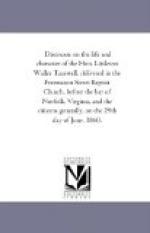While young Tazewell was gradually making his way at the bar, practising in James City, and in all the neighboring courts, he was called upon to take his stand in politics at one of the most tempestuous epochs in our annals. His father was one of that illustrious band of patriots, consisting of Patrick Henry, George Mason, William Grayson, Richard Henry Lee, Benjamin Harrison, John Tyler, and others, who believed that the General Federal Convention, which had been summoned merely to amend the Articles of Confederation, had exceeded their powers in framing an entirely new instrument, the present federal constitution, and they warmly opposed its ratification by Virginia. When the new system was adopted, they watched its operations with a jealous eye, and opposed some of the leading measures of the administration of Washington. When it was foreseen that a new treaty would be negotiated with England, it was determined by them that, unless that measure made those concessions and amendments of the treaty of 1783, which Virginia had striven so hard to obtain, it should be opposed at every hazard; and John Taylor of Caroline, happening to resign his seat in the Senate just at that time (1795), Henry Tazewell, then on the bench of the Court of Appeals, was elected to fill his place; and the first movement he made on taking his seat in the Senate was to offer a series of resolutions pointing out the defects of the new treaty with England, which had been negotiated by Mr. Jay. It was natural that young Tazewell should embrace the doctrines of the party in which his father held almost the chief place; and his inclination in this respect was probably strengthened by the opinions




